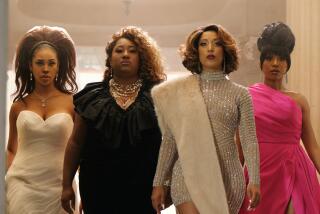CONTRACEPTIVE ISSUE: NETWORKS ON THE SPOT
- Share via
Welcome to the 19th Century.
ABC, CBS and NBC--whose entertainment programs routinely glamorize casual sex--are refusing to air a public-service message aimed at reducing unintended pregnancies and curbing abortions.
Why? The unpaid spot, produced for the American College of Obstetricians and Gynecologists as part of a public education and media campaign, promotes knowledge of contraception.
Uh-oh.
Contraception equals controversy in the eyes of the three networks, which for years have rejected public service spots they define as controversial. They’ve also rejected ads for contraceptive products on the spurious grounds that the ads would repel millions of Americans.
Even more so than commercials for Preparation H?
“Birth control and contraception are a very controversial issue,” one “best left to our news and public affairs coverage where both sides of the issue are well represented,” said George Schweitzer, CBS vice president for communications, last week.
ABC and NBC gave similar reasons for turning down the spot. Cable News Network and Lifetime cable accepted it.
“It’s hard to believe they (the three networks) would define as controversial something that 90% of the American public believes belongs in the public schools,” said Dr. Luella Klein, ACOG immediate past president, at a New York press conference last week.
The spot is not pro sex. It’s pro information.
Scene 1: A wholesome young woman steps off a school bus and says, “I intend to be President.”
Scene 2: Another wholesome young woman working at a home computer says, “I intend to go back to school.”
Scene 3: A third wholesome young woman working over a stove--and very, very pregnant--says, “I intended to have a family . . . but not this soon.”
Finally an announcer adds, “Nothing changes any intentions faster than an unintended pregnancy. Unintended pregnancies have risks, greater risks than any of today’s contraceptives.” He then gives a number to call for information about birth control methods.
Scandalous? Outrageous? Monstrous? Hardly.
There may be several words to describe the big three networks’ rejection of the spot, but hypocritical tops the list.
Those moral zealots ABC, CBS and NBC, as unflinching guardians of the national virtue, forbid anyone on the air to utter or even mutter that well-known four-letter word for sexual intercourse. But they’ll go as far as they think they can go in depicting or trivializing or giggling about what the four-letter word describes. And using sex to sell their programs.
If the networks accepted the contraception spot, wouldn’t they be opening the door to something, well, radical or obnoxious? Why this could lead to, to. . . .
“To what?” Klein was asked by telephone at her Atlanta office Monday. “To commercials about hemorrhoids? To commercials about feminine deodorant spray with just a hint of musk? We already have those.”
Klein noted that many teen-agers take their moral cues from TV, a medium that usually “gives no indication that pregnancy is a result of sexual intimacy.” And, of course, even the networks are innocent lambs in contrast to cable’s teen-watched MTV, where rock videos often routinely glamorize sex with no mention of consequences.
This is not a call for bluenoses to take to the streets. The American College of Obstetricians and Gynecologists is not advocating an exorcism of sexual themes from the airwaves, only sex with accountability.
In some ways, this is a continuation of a longstanding debate. In 1976, novelist Dan Wakefield quit as story consultant on the NBC series that he created, “James at 15,” when NBC deleted a reference to birth-control pills in a script the network directed him to write about James losing his virginity.
Although the so-called sexual revolution, including youthful sexual activity, was already in full swing, NBC contended that the reference in the script to contraception would promote promiscuity. Wakefield correctly argued that it would promote responsibility.
Responsibility is often the secret word at the networks.
In an average year, viewers are exposed to more than 9,000 scenes of suggested sexual intercourse, sexual comment or innuendo, according to a 1982 book, “The Early Window: Effects of Television on Children and Youth.”
But we don’t need professional researchers to tell us what we can see with our own eyes. Network programs are preoccupied with sex, Klein said at her press conference. “Then we get two to four minutes of purity at the commercial break before getting back to the bedrooms.”
Delete the hyperbole and she’s right on target. Daytime soap operas sell more sex than soap, most of it of the extramarital variety and seldom with a mention of contraception. Sex is also a vital element of prime-time soap operas a la steamy “Dynasty.” And as Klein notes, “We all know ‘Dallas’ is not a story about a town.”
It was never “controversial” for ABC and NBC to try jiggling their way up the Nielsen scale in the 1970s, yet it’s “controversial” to run a public-service spot that promotes information and mentions contraception.
CBS, which thinks that airing an unpaid responsibility-with-sex message would be improper, has no regrets about airing titillating promos for such new prime-time series as “I Had Three Wives.”
“We have written the networks asking them to reconsider,” Klein said from Atlanta, “and telling them that America has changed since the ‘60s. We also have asked them to consider some input about sexual responsibility in soap operas and other programs.”
Fat chance. The networks are saying that the American College of Obstetricians and Gynecologists’ only recourse is to purchase air time for its message or to rely on their news divisions to provide the balance lacking in entertainment programs. “We’re not an advertiser,” Klein said. “Our public service was in having the spot made.”
One-night stands abound on TV. Just once, Ellen Goodman wrote in her syndicated column, she would like to hear one of the TV lovers ask before hitting the sack: “Your contraceptive or mine?”
Meanwhile, Klein said that the United States has an unintended pregnancy rate of 3.3 million annually and a teen-age pregnancy rate among the highest of developed nations. Perhaps the contraception message could help trim those figures. But it’s too controversial.
More to Read
The complete guide to home viewing
Get Screen Gab for everything about the TV shows and streaming movies everyone’s talking about.
You may occasionally receive promotional content from the Los Angeles Times.






